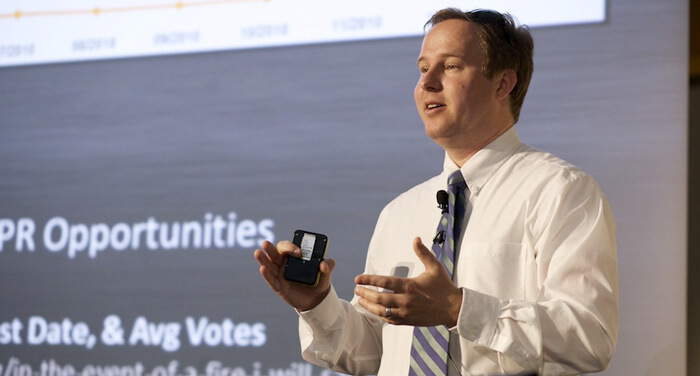
Russ Jones (courtesy of Moz)
Moz has just upgraded its “domain authority” (DA) scoring. DA is intended to be a kind of proxy for and predict how well sites will rank and how they compare to competitors’ rankings over time.
Moz says, “Domain Authority has become the industry standard for measuring the strength of a domain relative to ranking.” Though widely used, it has been somewhat controversial. Some SEOs have complained that it causes “distraction” or creates “confusion” for novice SEOs who focus on it without proper context.
The new DA is rolling out this week, so I asked Russ Jones, principal search scientist at Moz, to explain the changes, as well as respond to some of the controversy surrounding it.
What is Domain Authority?
Jones: Domain Authority is a search engine ranking score developed by Moz that predicts how likely a website will rank on search engine result pages (SERPs). DA scores range from one to 100, with higher scores corresponding to a greater ability to rank.
DA is calculated by evaluating linking root domains, the number of total links, spam scores and other proprietary metrics into a single score.
Why does the industry need this?
Jones: Domain Authority is a comparative metric, and I cannot stress this enough. On its own, in a vacuum, DA means very little. When looked at through the lens of competitors – such as comparing Papa Johns to Pizza Hut to Little Caesars – DA is a very powerful metric.
Google is a black box. Outside of few and far between insights, little is known about exactly how Google ranks search results. Domain Authority is the best metric to date that can predict how likely a website will rank, and, therefore, marketers should be monitoring their DA carefully.
What has changed specifically in the new release?
Jones: Three key things are changing: the training set, the training algorithm, and the model factors.
Rather than rely only on actual SERPs in the training model, we seed random non-ranking pages into the last position occasionally so the model can learn about sites that never rank at all. The training algorithm once relied on a complex linear regression model to express relationships. Now, we are utilizing a neural network, meaning DA will get “smarter” and more accurate over time.
We are also monitoring more than 35 trillion links, powered by our Moz Link Explorer. These links now monitored for quality in addition to quantity. We have integrated our proprietary Spam Score metric, along with other factors, to better measure link quality.
What will be the biggest impact on DA now that the new scoring has been released?
Jones: In the short term, Domain Authority scores, by and large, will go down across the board by about 7 percent. This drop reflects a re-centering of Domain Authority.
In the long term, marketers will see that Domain Authority scores will adjust and correct themselves much more rapidly. This is thanks to the enhanced link database which updates far more frequently than our old index.
You’ve said DA is a diagnostic tool to help webmasters improve site performance. How does DA do that?
Jones: To be clear, Domain Authority enables webmasters to make decisions on what they might need to do to improve site performance. For example, if a webmaster’s site has far fewer rankings than a competitor, despite having a higher Domain Authority, it likely indicates that the webmaster needs to improve the quality and quantity of content on their site.
Some companies have abused DA with link-selling/buying schemes. How does the new release try to address the problem?
Jones: Through our link index, spam detection and advanced machine-learned model, Moz can identify link manipulation and devalue DA scores in a way similar to how Google and Bing devalue bad backlinks. Our model does not specifically target any particular type of scheme, but rather identifies patterns of link manipulation that don’t result in improved rankings and devalues them.
How would you respond to the charge that DA is a “distraction” and that improving your DA doesn’t mean you’re improving your rankings?
Jones: Domain Authority is meaningless when it isn’t compared to other sites, full stop. What matters isn’t whether your site drops or increases — it’s whether it drops or increases relative to your competitors.
Furthermore, Domain Authority is just one metric to illustrate a website’s search performance. Page Authority, Keyword Difficulty, Keyword Opportunity, Keyword Volume, Rankings, CTR, and local search best practices are slices of the same pie that marketers need to be monitoring and measuring against as well. Issues only arise when webmasters fixate on one metric, whether that is Domain Authority or anything else.
